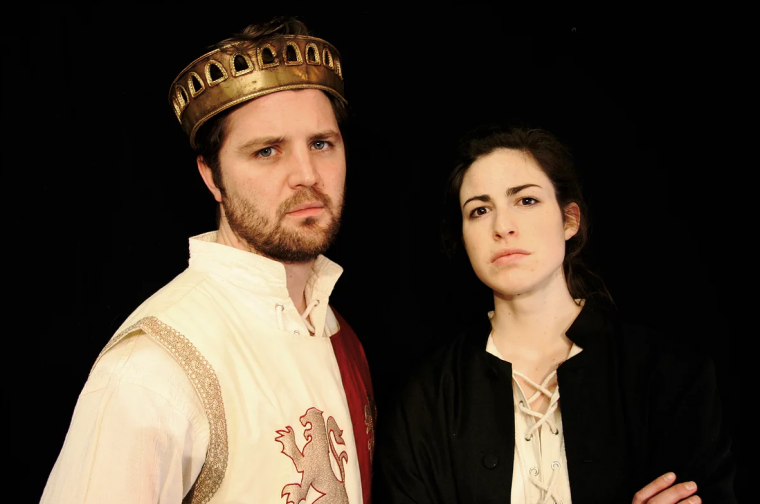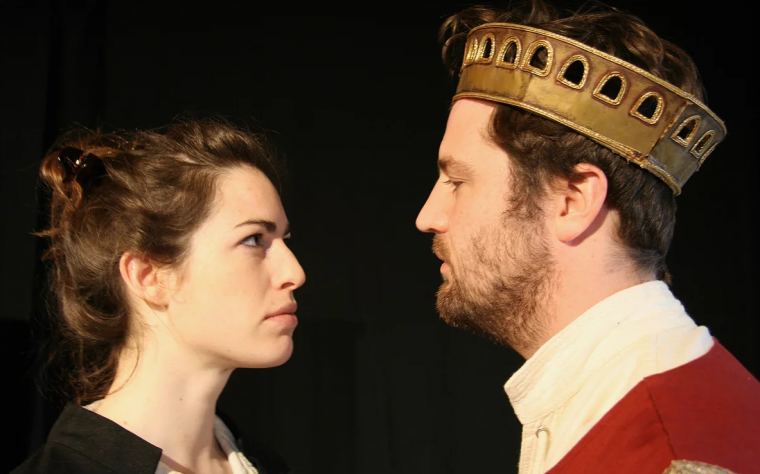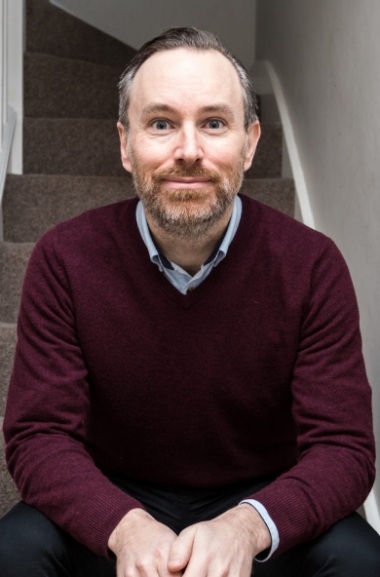A turbulent Christian comedy for turbulent times

Christian writer/director James Cary is, in his own words, "hooked by the idea of comedy", and believes that people in general are, too. It's his medium of choice not simply because he wants to make Christians laugh, but because he wants to get them thinking in new and meaningful ways about familiar and sometimes somber aspects of the Christian faith.
Last time, his comedy musical, A Monk's Tale, told the story of Martin Luther and the Reformation. Cary seemed to instinctively know what his audience would be thinking - that this couldn't possibly be funny - and that scepticism was weaved into the opening scene in which one character tries to convince the other that the musical is going to be great.
It's a dig he takes again with his new play, A Turbulent Priest, the promotional poster for which promises audiences "The epic story of Thomas Becket. With jokes & songs, obviously."
If Martin Luther and the Reformation were somber, the matrydom of Thomas Becket is dark. Yet Cary sees in it the unlikely inspiration for a comedy that can speak much more into the current times than one might initially think. His choice of title, A Turbulent Priest, hints at the connection.
"I'm a comedy writer so I don't really know how to do anything else," says Cary.
"My instinct is always to find these moments and bits and characters, and play them comedically. I've always been drawn to doing that way of doing history.
"And there has been a noble tradition of doing funny history going back to Monty Python and the Holy Grail, Blackadder and Horrible Histories.
"The problem with Horrible Histories is that although they made history accessible, even my kids can spot that they think religion is stupid. The religious person is always portrayed as an irrational idiot next to a very sensible Enlightenment thinker."
So, comedy it is, and Cary sees plenty of comedy mileage in Becket's life prior to his fatal clash with Henry II.
For instance, despite being Lord Chancellor and later ascending through the Church to become Archbishop of Canterbury, Becket wasn't particularly good at Latin and came somewhat late to canon law.
His poor Latin was apparently exposed when he had to use it to deliver a speech to the Pope at the Council of Tours on the beatification of Anselm.
"He hacked his way through it and everyone was a little bit embarrassed," says an amused Cary - a BBC sitcom writer when he's not staging comedies for the Church.
Becket's average skills are an aspect of this "mighty figure" in British history that appeal to Cary and a quality he thinks most people can relate to.
"In some ways, he was just out of his depth quite a lot of the time and making it up as he went along.
"Kings like Henry II think 'I deserve to be here, I'm special and anointed by God', but the rest of us? We're just making it up as we go along."
Luckily for Becket, help was at hand in the form of his secretary and close associate, John of Salisbury, who was both excellent in Latin and an esteemed scholar.
The play sticks to the real-life story as much as possible but it's not all for laughs, Cary admits. Rather, comedy is the vehicle to pull out the enduring lessons from the time.
"The show does get fairly serious by the end, because although I'm fairly comfortable with being a little flippant in general, Becket's death is a serious and important event," he says.
"We're not playing that part for comedy but explaining comedically the meaning of it all and what it all represents."

Aside from choosing to tell the story of Becket through comedy, what makes Cary's telling of his life even more surprising is his choice to cast a woman to play the man.
"From the very beginning, I wanted Thomas Becket to be played by a woman because Becket represents the Church and the Church is female, the bride of Christ," he says.
But it's not a feminist statement, he clarifies.
"That would be unlikely given that I'm a pretty conservative complementarian. Actually, I'm uber conservative in my own personal theology and really conservative on gender," says Cary, who describes himself as a conservative, reformed evangelical "with tendencies towards Calvinism".
He continues: "In a TV drama, where realism is expected, it would be a bit weird to cast Becket as a woman. But theatre is a bubble, so artistically it works and the audiences sort of don't care.
"In fact, what's weird is how much it isn't weird. With a few props and costumes, the audience just accepts that this person is Becket and this person is Henry."
In Cary's mind, casting two men to play Becket and Henry might even have made the early "bromance" between the two "seem a bit odd and homoerotic".
"It really wasn't a homoerotic relationship but now we can so often construe male friendships in that way," he says.
"For me, it was always the symbolism of Becket, that he represents the Church and its being female. Henry II is the crown - and a very masculine version of that."
While writing episodes for Miranda or other TV sitcoms is fun, putting together plays for the Church is a personal mission for Cary, a mission he hopes will "help Christians make better use of the performing arts and not be terrified of it".
He wants Christians "to feel equipped and knowledgeable about their own Christian heritage", and take more pride in it.
"The secular media wants to make Christians feel deeply ashamed about everything that's happened in the past and believe that it's all the Church's fault and it's all Christianity's fault, and I want to say no, that's idiotic, and that virtually everything we hold to be sacred in modern society is as a result of Christianity.
"It's not basic common sense, because if you go to other countries which do not have a Christian heritage, they do not share our views on what basic common sense is. Try basic common sense in Kabul or Tehran or countries that are saturated in Hinduism. These values are not self-evident.
"I'm always keen for us to say that we are where we are now because of the Christian story, and whether you believe it or not is out of my hands.

"I would like people to believe that and I would pray for that, but I want Christians to feel a certain amount of pride because we have lots to celebrate.
"And I want them to remember that we've been here before, so that when things don't look very good - which they don't right now - they will remember the stories of Thomas Becket, Wycliffe, the Lollards, Cranmer, the Reformation, the Puritans, Wesley and Whitfield, The Salvation Army and Wilberforce.
"My passion is the Bible but we have such a brilliant Christian history and I think there is a lot that can be done with that history."
There's more to the choice of Becket, too. The timing is pertinent as next year marks the 850th anniversary of Becket's murder.
"History repeats itself," Cary notes, and just as the clash between the Church and the secular power of the day came to a bloody head in the life and times of Becket, Cary sees parallels with what is happening today.
The question he wants Christians watching the play to answer for themselves is whether they will do what Becket did and make a stand for their beliefs, even if it means paying the ultimate price.
"As a libertarian, I don't fundamentally believe in a mighty state, but there is an absolutely huge cultural and theological iceberg heading towards the Church of England, which is the state now telling people that 'you are going to think this', 'you are going to believe this'.
"And if you say 'well, I'm a Christian so I can't', then they're going to say 'oh well, then we're going to have to send you to jail now.'
"I can't see how this is not going to happen in my own lifetime and we're already getting it with bakers refusing to bake a certain cake.
"It should be idiotic and self-evidently absurd, but it's not and there are still people today who think the state should say to the Church 'you will do exactly what you are told by the state'.
"It's the classic case of the Church saying 'we answer to a higher authority'. In Thomas Becket's case it was Rome and God, and in the evangelical case, it's just God.
"But if it comes to who's going to win, then we're going to lose because they have guns and we don't. And they have the coercive right given by God to assert rule - that's Romans 13 - and we're going to be on the end of that.
"So, we show Thomas Becket's story in the light of triumph through sacrifice and death. And all the words he says in his final scene are all words he is recorded as having said that night in Canterbury Cathedral, that by his blood he would buy liberty for the Church.
"The question for us is: are we prepared to do what Becket did, which is what Jesus did?"
Catch A Turbulent Priest next at St James's, Clerkenwell, in London on July 4 and 5 at 7:30pm. Find out more at at https://www.aturbulentpriest.com











